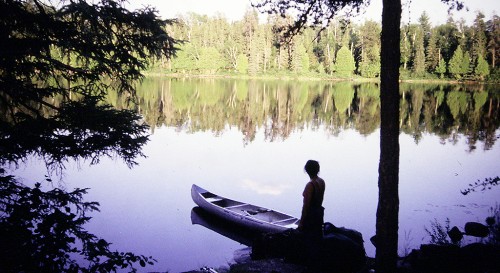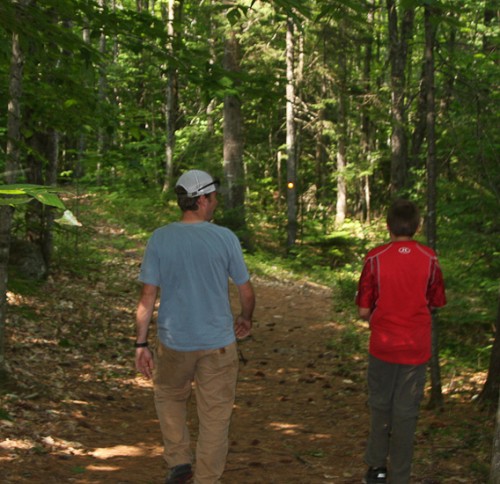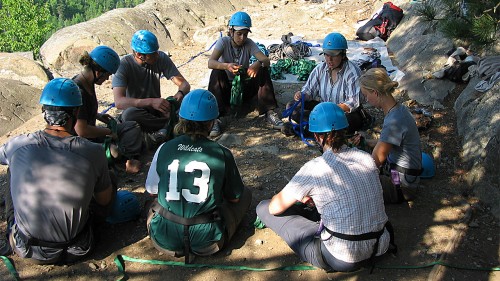I’ve had the opportunity to do a lot of work instructing courses for Voyageur Outward Bound School’s award-winning Intercept Program. I’ve also had the privilege of learning from teens who challenge the status quo.
Students experience the awe-inspiring sunsets on the Boundary Waters
Often times we become so focused on a teen’s behavior and how we can create change, that we forget about how we respond. It’s important to take a look at ourselves, and think critically about how we interact with them, and how they interact with one another. Below are tools I’ve learned over the years and regularly exercise in the field when working with teenagers.
1. The Need for Confidence, Patience, and Resilience
It’s an almost instinctual response. We can get defensive, angry, and spiteful when we feel disrespected. We can become aggressive, we assert and demonstrate the power we have. We try to use it to our advantage. Think about ways that you have done this.
Teens can be gutless. With each other, and with you. They can say some pretty horrible things, as can we. As an Instructor and an authority figure, it is my responsibility to manage this.
Consider this scenario:
Mike and Tom’s jobs for the night are to be camp managers. They need to set up the tents and set up sleeping systems. Mike and Tom have never really been on the same page. They’re typically really sarcastic with one another, and actively avoid one another. But tonight, they have to work together. Oh, and guess what? It’s raining. So they must work together, under pressure, in a time crunch, on a project that fellow team members are going to rely on them for. Sound familiar?
After struggling with the tent poles, and arguing with one another simply because the conditions are difficult, it escalates. Tom and Mike get in each other’s face, yelling at one another. Eventually, Tom runs into the woods, and the tents are left laying on the ground, getting soaked in the rain.
You rush into the woods after Tom, but he has no interest in speaking to you. “Get away from me, leave me alone, I don’t want to talk to you, I don’t want to talk to anybody!”
What do you do?
In terms of dealing with this situation, there isn’t a right answer. We can only try things. Should we bring them back together and force them to work together and get the tent set up? Does checking in with each of them individually have any value? Do I really need the “whole truth?”
I think, instinctively, we want to rush into the situation, resolve it quickly, and get the tent set up before it gets soaked. But we need to slow down. Let Tom cool off, maybe go chat with Mike, let them vent.

A student takes time to think in the Boundary Waters. Photo by Suellen Sack
Is it okay that the tent is getting soaked? Definitely. Why? Because Tom and Mike need to learn how to work together, regardless of the circumstances. The tent getting soaked is just a natural consequence.
- Give them space to cool down.
- Address the issue when there is a little less pressure.
- De-escalate the situation by having one-on-one check-ins with each of them.
- Remind yourself you have time — wet tents dry out, food gets cooked and eaten, eventualities remain eventualities.
In this scenario, we don’t know what was said. Chances are we’ll never know fully, so don’t waste time by trying to figure out all the details. Yes, it is important that they choose not to say something like this in the future, but really, the lesson here is teaching Tom and Mike the importance of working together when things get hard. Telling Mike or Tom not to say a certain thing won’t have any sort of long term impact. Re-direct the conversation and focus on why it’s important we work together. Resist the desire to be “in the loop.”
When the time is right, Mike and Tom can address what was said. If they feel more comfortable and have demonstrated an ability to have a constructive conversation, step away. Empower them to address it autonomously. If they are able to resolve it, praise their efforts.
It is almost certain that Mike and Tom will have to work with somebody in the future that they do not like. In my experience, aligning people with a sense of purpose and with a focus on mutual respect, is a good stepping stone. In this situation, we all want dinner and we all want to get out of the rain, so how can we work towards this together? Mike and Tom may not like one another, but they are dependent on each other, whether they like it or not. Therefore, if we focus on why they need to respect that co-dependency, we can work towards respecting one another, regardless of their differences.
2. Transparency and Authenticity are Key
Teenagers have an incredible knack for knowing when they aren’t being treated “like an adult.” They rebel against it. Some authority figures may have experienced a never-ending cycle of being asked “why?” Why do I have to do that? Why is that important? Why should I care? Think about how many times the response to those inquiries is “because I said so!”
Understandably, often times we can be at our wits end. But teenagers are constantly in search of direction, of answers, whether they act like it or not. So be transparent. If you can’t answer those “why” questions yourself, then its probably time to re-evaluate what you’re asking them to do.

A parent and son spend time together during the Intercept family conference.
Consider this scenario:
Instructor: “Sarah, can you please go fill up the pots with water and prep for dinner?”
Sarah: “Why? Get somebody else to do that, I’m busy.”
Instructor: “You don’t look busy. Come on Sarah, I asked you nicely. Please go get the water.”
Sarah: “No! I don’t want to.”
This type of situation can escalate quickly, and it’s all too common. As an authority figure, we’re being clear about how we’re asking for something, rather than being transparent about why it needs to happen. If you can align yourself and a teen with the purpose of a task they may feel empowered, or a part of something, rather than being undermined and bossed around. How you say something can be your greatest ally or worst enemy.
Consider this next scenario:
Instructor: “Sarah, can you grab the pots and fill ‘em up? We need them to prep for dinner.”
Sarah: “Get somebody else to do that, I’m busy.”
Instructor: “OK, well come on over anyway, let’s chat real quick.”
walk down to the water
Instructor: “I know it sucks that we have to do all these time consuming chores, but its important that we get food in our bellies. We have a long day of travel tomorrow. Plus, as soon as we get all of our camp chores done, we can chill, eat a hot meal, and get to sleep earlier.”
Fill the pots up with water together
Sarah: “I just hate doing all this, it is so much stuff, and I’m tired.”
Instructor: “I know, right? I’m pretty tired too, but I know a good meal will help me feel better. What do you say we go get dinner started?”
So whats different? Notice the we vs. you language. This type of language can have a great impact on minimizing power struggles. It is collective language vs. isolating language. Also, there is much more patience and transparency. The Instructor is clear about why they need to get water. They also don’t get defensive when Sarah pushes back against the request, instead, they are patient.
There is no doubt this is extremely difficult and takes intentional practice. The instructor also did the chore with Sarah. Demonstrating the simplicity, value, and necessity of the task. The instructor also acts with compassion and speaks with Sarah from an empathetic standpoint. Compare this to the authoritative, and insensitive approach from the first scenario.

An Outward Bound Instructor hold a group discussion with students.
If we try to be consistent with our language; patient when it comes to peoples responses; and are willing to empathize and be authentic with each other, we can make incremental improvements by building a relationship.
If we offer real answers to tough questions, rather than masking or hiding from the truth, it’s another building block. If we’re clear about why we do things, and offer to help during the process, it is another building block. Sometimes we get frustrated, annoyed, or offended. If we act on that, things often get worse. If we’re patient, resilient and authentic, we become better leaders, and more importantly, compassionate human beings.
DISCLAIMER: These tools aren’t based in any formal research. They are solely based on my experience and the lessons I’ve learned as an Instructor with VOBS, and as an outdoor educator in general.
For more information on Intercept expeditions, go HERE. Call 866.467.7651 to speak with an Admissions Advisor who can answer questions, provide more information, and suggest upcoming Intercept expeditions.
This blog was originally published as a three-part article on the Voyageur Outward Bound School blog.
About the Author
Jack Hilbrich is passionate about leadership, education, and the outdoors. A summer internship with Outward Bound in 2010 launched a career as a field instructor, educator, facilitator, and guide. Jack’s experience has taken him to the mountains of Colorado, the desert of the American southwest, the beautiful lakes and rivers in the Northwoods of Minnesota and Canada, and the Appalachian Mountains in New England. Jack enjoys paddling, biking, backpacking and laughing.





